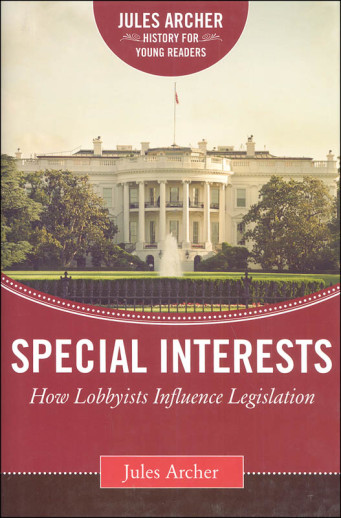We use cookies to make your experience better. To comply with the new e-Privacy directive, we need to ask for your consent to set the cookies. Learn more.
Special Interests (Jules Archer History for Young Readers)
This brief text gives readers a great understanding of what organized lobbies are and what lobbyists do in the political realm. The author, Jules Archer, provides different examples of laws that a lobbyist might fight for or against, such as environmental issues. The book is riddled with political cartoons which breaks up the reading and provides some insight into the relationship between government and lobbyists. This would be a great text to add to a government course, as it will expand and add to the learning of the American system. Pgs. 122 | Hardcover. ~Rebecca
In order to advance their various causes and concerns, these groups hire individuals or firms called lobbyists to work on their behalf to influence the decisions of state and federal lawmakers.
Lobbies have been a part of American history ever since Benjamin Franklin appealed to Britain's Parliament to remove a tax on stamps in 1757. The right of any person or group to ?petition the government for a redress of grievances was and is protected by the first amendment, remembering the British government's refusal to listen to the grievances of the American colonists, which brought on the American Revolution.
Today, however, many lobbying activities have exceeded the boundaries of Thomas Jefferson's original good intention and often involve the inappropriate use of money and influence to gain advantages that are not always in the public interest. Although lobbyists have the right to appeal to and advise our legislators, only our elected officials have the right to actually write our laws.
Jules Archer has written a broad-reaching description of the lobbying system in America. He describes who lobbyists are and discusses perks, PACS, and pork, and the various other means that lobbyists use to influence legislators, the public, and even the White House.
This topical history series makes a great add-on to history programs. It gives students the freedom to read about historically accurate events and people throughout U.S. and World History without getting overwhelmed. Jules Archer gives a unique voice and approach to his writing; making it engaging for students to learn and hone their critical thinking skills. Each book is equipped with an index and a bibliography to help facilitate further studies. Some of the content can cover a dark side of history. Content can become mature when exploring dictators, treasonous acts, rage behind the riots, and the circumstances surrounding our countries own laws. There are political cartoons, illustrations, and photographs included throughout the texts that benefit the reader in putting faces to some of the featured personalities. The series provides a helpful glimpse into the state of the U.S. during some of its most tumultuous times. ~Rebecca
| Product Format: | Hardcover |
|---|---|
| Brand: | Sky Horse Publishing |
| Grades: | 7-AD |
| ISBN: | 9781634501903 |
| Length in Inches: | 8.5 |
| Width in Inches: | 5.875 |
| Height in Inches: | 0.625 |
| Weight in Pounds: | 0.6 |

